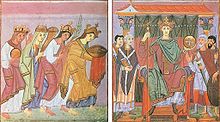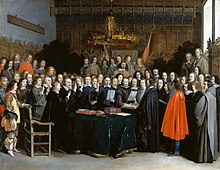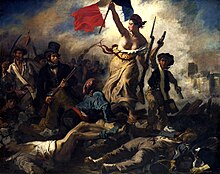Nation state
The nation state is a state model based on the idea and sovereignty of the nation . About nation-state , the state formation coincides with the concept of the nation. Linguistic, cultural or ethnic homogeneity is often named as a prerequisite and goal of the nation state in the discourse about the nation. The ideas of the nation and the nation-state are also known as constructs .
Nation state, multi-ethnic state and nation of will
The nation state presupposes a state and a nation. Both emerged from historical developments and are not a “natural” prerequisite for human coexistence. Developing nation states should - according to the supporters of the nation state idea - unite the essential parts of the state-bearing and mostly eponymous people ( titular nation ) (cf. right of peoples to self-determination ). The part of the population that supports the state should feel connected to a common culture or tradition. Ideally , a nation state includes all members of a people and also only members of this people or culture group.
The opposite of the nation state is the multi-ethnic state , which unites members of more than one nation within its national territory . If different peoples want to live together in one state , one speaks of a nation of will . Examples of today's willing nations are the Swiss Confederation , the Kingdom of Belgium or the United States of America .
Today, for example, the island states Japan and Iceland are largely approximated to the type of the nation state . It becomes far more complicated for emerging states that see themselves as nation states when the settlement areas of different peoples overlap. In this case, the attempt to found a nation state can degenerate into a war if overlapping peoples want to found their respective nation state on the same territory (e.g. German-Danish war , Balkan wars , Middle East conflict ). Conflicts can also arise if individual peoples want to leave a multi-ethnic state with their settlement area. One then speaks of separatism or secession . Such striving for the sovereignty of one's own settlement area and for the emancipation of one's own people can be found regularly where a people of a multi-ethnic state dominated by a larger people sees themselves, their interests or their culture as oppressed, underrepresented or threatened. Since a separation or downsizing of the state is usually not in the interest of the multi-ethnic state, the conflict of interests between the peoples can lead to civil war (e.g. Yugoslav wars ), repression (e.g. Kurdistan ), and rarely to a peaceful attempted solution (e.g. . Québec , Druze and Arabs (Bedouins) in Israel run).
history



If one disregards premodern forerunners such as the Assyrian , Roman or Chinese empires , and ignores Eretz Israel as a nation in an ideal community, nationalism is a development of modern European times . Their forerunners in the European Middle Ages were staff associations which, due to their orientation and dependence on a ruler , a dynasty or a co-operative ruling association, were largely able to dispense with the criteria that make up a state. They stabilized themselves through the personal bond between rulers and subjects. Early forms of national consciousness developed during the time of the Crusades , particularly in France under Louis VI. (1081–1137) and since the Albigensian Crusade under a predominant national religion . The Peace of Westphalia of 1648, in which states began to establish themselves as sovereign subjects of international law with the concept of the Westphalian system , formed a level of international diplomacy and an early form of nation-state action .
The idea of the nation state moved completely into the center of politics from the 18th century, when the situation of the population had deteriorated significantly as a result of large national debts, high taxes ( absolutism , mercantilism ) and fierce wars ( Austrian War of Succession , Seven Years War ) . In this context, ideas that emphasized the idea of a nation as a community in the sense of an idealized self-image and were mixed up, such as democracy , patriotism , nationalism, socialism , liberalism, found wide acceptance . Ethnic or cultural minorities were often made collectively responsible for the poor living conditions in the sense of an enemy image . Shortly after the French Revolution , there was therefore a reign of terror and coalition wars .
Leading nation-state politicians often wanted to achieve economic self-sufficiency .
Minorities
Where a significant number of citizens of a nation state belong to a people other than the main people of the state , one speaks of a minority . Ideological or ethnic minorities , especially in centralized states, have a strong urge for autonomy . Depending on the severity of centralism and the desire for autonomy, there may be differently pronounced conflicts or their solution.
Examples of minorities are the Danes in Schleswig-Holstein , the Germans in Denmark or Poland , the South Tyroleans in Italy , the Sorbs in Brandenburg and Saxony or the Kurds in Turkey . But there are different types of minorities:
- In the case of the Danes in southern Schleswig and the Germans in northern Schleswig , the people feel culturally connected to a neighboring nation. Such national minorities arise in border areas if national borders were formed at times when the concept of nationality did not yet exist or if - as in this example - there are mixed settlement areas that could not be spatially separated or forcible division (through forced resettlement or Expulsion ) was waived.
- The Sorbs form a minority that lives largely closed on German territory, but has too few members and lives too scattered to form a national state of their own.
- The Kurds, on the other hand, live as minorities in several states, including Turkey, Iran , Syria and Iraq , without ever having formed their own nation state.
Saturated (saturated) nation states should actually be very peaceful states. They have no claims to other countries and also no sense of mission that can lead to plans for conquest.
assimilation
Assimilation usually always takes place over time when the minority has no interest, is not big enough or does not have enough assertiveness against the majority to form its own nation-state or to join the nation-state of their nation. In the course of the generations, the mother tongue changes and with it also nationality, cultural sense of belonging and own identity. An example of this are Alsatians and Lorraineurs .
In countries with insecure handling of their own identity, there may be pressure to assimilate the minority.
separatism
Separatism is the urge of the population group of a nation-state to form their own state or to join another state due to an independent culture or an ethnicity that is different from the national ethnic group. Examples are the Basques , Catalans , Kurds , Albanians or the Uighurs .
Often there is only a perspective difference between the terms separatism and nationalism , depending on the point of view of the existing state or the secessionists.
Irredentism
If members of the state-supporting nation live outside the borders of the nation-state, this can also result in political problems. If they live in a closed area, this can lead to the requirement to join this to the nation state, for example from Ireland with regard to Northern Ireland . This is what the term irredentism stands for (from the Italian irredenta for "unredeemed"). If they do not live in a closed area, this can lead to repatriation actions. The ethnic repatriates in Germany are one example .
The nation state concept in the 21st century
It is doubted that the definition of a nation can be fully met through common characteristics such as language , tradition , customs , customs or ancestry .
Sociologists criticize the notion that all permanent residents of a state must be exclusively part of the nation belonging to it, or at least try to become one. Especially in the context of increasing mixing cultures within young people's worlds, ideas of social and political education based on national categories did not seem a perfect fit. The central strategy for the development of the nation state is the homogenization of language, education and ways of life. However, the life arrangements of adolescents and young adults with a migration background clearly showed the integrating power of diversity management , which favors political participation on the basis of hybridized (multiple) affiliations.
Constitutional patriotism has developed as an alternative citizenship concept . In the social science literature, a distinction is made between the terms state nation , nation of will and nation of culture .
literature
- Bassam Tibi : From the kingdom of God to the nation state. Islam and Pan-Arab Nationalism . Suhrkamp, Frankfurt am Main 1987, ISBN 3-518-28250-6 .
- Alfred Schobert, Siegfried Jäger (ed.): Myth identity. Fiction with consequences , Unrast, Münster 2004, ISBN 3-89771-735-2 (= Duisburg Institute for Language and Social Research: Edition DISS , Volume 6). (international overview of nation and identity formation)
- Hagen Schulze : State and Nation in European History . 2nd edition, Beck, Munich 2004, ISBN 3-406-51109-0 .
- Guenther Sandleben: Economics and State, to the criticism of the theory of finance capital . VSA, Hamburg 2003, ISBN 978-3-89965-030-3 .
- Ralf Dahrendorf : Challenges to Liberal Democracies. Lecture on the tenth anniversary of the Federal President Theodor Heuss House Foundation, Federal President Theodor Heuss House Foundation, Stuttgart 2007, ISBN 978-3-9809603-3-5 (= Small Series , Volume 19).
Web links
Individual evidence
- ^ Rüdiger Voigt: Weltordnungspolitik . Wiesbaden 2005, ISBN 3-531-14859-1 , p. 177 f .; Stefan Heyms, Doris Lindner: "Writing for a better Germany". Concepts of nations in German history and their literary design in the works. Würzburg 2002, ISBN 3-8260-2257-2 , p. 21.
- ↑ See Duden , German Universal Dictionary , 5th edition, Bibliographisches Institut & FA Brockhaus AG, Mannheim 2003, keyword “Nationstaat”.
- ↑ See Karl Vocelka : The Habsburg and Habsburg-Lothringen families. Politics - Culture - Mentality , Böhlau, Vienna / Cologne / Weimar 2010, p. 51 .
- ↑ Eric J. Hobsbawm: Nations and Nationalism: Myth and Reality since 1780. Campus, Frankfurt am Main 2005, p. 16.
- ↑ Hans-Joachim Roth: Living situation and political positioning of young people with a migration background - some theses . In: From Politics and Contemporary History , issue 5/2009 from January 26, 2009 ( online ).